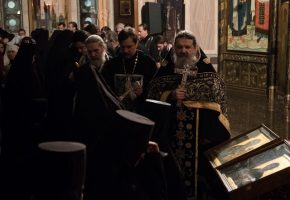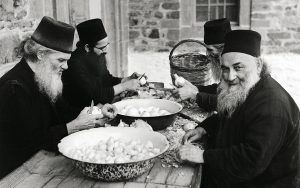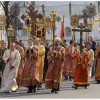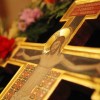When in Church circles they say, “During the fast of that year, this or that took place” or “I’ll visit you during the fast”, they usually mean the fast of Great Lent, and the other three fasts in this case need to be specified. It is truly a fast “with a capital letter”. Moreover, it is the only fast in the Church that calls for special liturgical services. The services of Peter and Paul’s fast, for example, do not differ from the usual ones. Likewise the services during the Dormition and the Nativity fasts essentially remain the same. There are maybe two or three prayers during the Nativity fast that tell us that we’re approaching Christmas (it is mentioned in irmoses and catavasias), but in principle the style of the worship itself remains the same.
During Great Lent even the prayer “Lord, have mercy” is sung in a special tone. Very special prayers are read in a Christian home as well as in the Church. This illustrates the uniqueness of Great Lent.
When speaking about Church fasts, it is worth remembering their origin.
 In principle, the tradition to hold a fast goes back to Old Testament times. The custom in Judea was to fast twice a week, usually on Tuesdays and Thursdays. To avoid reproaches such as “the Jews fasts, and you became a Christian so that you don’t have to fast and can live with more comfort and ease”, Christians decided to fast also, but on different days – Wednesdays and Fridays.
In principle, the tradition to hold a fast goes back to Old Testament times. The custom in Judea was to fast twice a week, usually on Tuesdays and Thursdays. To avoid reproaches such as “the Jews fasts, and you became a Christian so that you don’t have to fast and can live with more comfort and ease”, Christians decided to fast also, but on different days – Wednesdays and Fridays.
The origin of the longer fasts is far more interesting.
Great Lent has a missionary origin. In the early Church, it was not the Christians but the pagans who fasted for forty days – those wishing to be baptized. To be baptized wasn’t as simple as dropping in briefly to the Church, getting anointed, and running off about your business. Mostly adults were baptized during those days. There weren’t that many Christian families yet, so children usually weren’t baptized. The majority of the baptized were adults who consciously chose to follow Christ. A man preparing for baptism wasn’t limiting himself to just reading books, as is often customary today. Now, after studying books, attending lectures and sermons, the person decides, “The time has come for me to be baptized.” Back then, the preparation for baptism was meant to shake the very soul of a person. This was the time for fasting and prayer. Now imagine a scene: you, a Christian, meet your neighbor on the street, who is still a pagan. You begin to preach the Gospel to him, telling him about Christ. He accepts it with his very heart and wishes to be baptized. Baptism back then took place only a few times a year, most commonly on the Holy Saturday before Pascha. And so the date is set for your neighbor’s baptism and he begins to fast in preparation. He lives next door. He comes over to visit you and you have chicken for dinner. You, a Christian, who told him about Christ and fasting, are enjoying this filling food, while your neighbor is conscientiously trying to hold the fast. To avoid such uncomfortable situations, Christians decided to fast also during this time for the sake of pagans, whom they recently led to Christ. Thus, Great Lent originated in the Church as a fast of solidarity, a time for praying not even so much for ourselves, as for those in this world whom we hope to guide to Christ.
In those days Christians themselves were fasting not during Great Lent or the Great Forty Days, but during Holy Week. So until now our fast is divided into two parts: the Great Forty Days and then Holy Week.
Holy Week is practically not even Great Lent – it is a separate, special time. We may say that the Great Forty Days is a time when we’re making steps towards God. Holy Week is a time when God steps towards us. He goes through suffering, through the arrest, and through the Last Supper, Calvary, the Descent into Hell and, at last, to the Resurrection. He overcomes the last obstacles which separate us from God.
Then comes the fast of Sts. Peter and Paul. Saint Hippolytus the Roman in his “Apostolic Tradition” (3rd century) describes the story of the origination of this fast: “If one couldn’t hold a fast during the Holy Week before Pascha, he should hold it a week after Pentecost”.
The meaning of this rule is quite clear. In those days, in the 3rd century, Christians had no general tradition of celebrating Pascha. The Church of Egypt celebrated Pascha by one calendar, the Church of Rome – by another, the Churches of Asia – following other calendars.
It gave pagans another cause for insulting Christians: “It’s your main holiday and you’re not able to tell exactly when it actually took place!” Later, in the 4th century, the first ecumenical council established one date for celebrating Pascha for everyone – the tradition of the Roman Church was spread among the other Christian Churches.
Well, and now imagine: first, not even every person can tell when exactly Pascha is celebrated, because, let’s say, he’s on a journey. At his homeland, let’s say in Alexandria, Pascha falls on the 20th of April. He travels to Rome, arrives there on the 15th of April, hoping to fast for 5 days before Pascha, but in Rome they’ve already celebrated Pascha on the 10th of April. The traveler had missed Pascha and, in a certain sense, he was left without the fast, without co-passion – compassion for our Lord, who went through crucifixion for us.
On the other hand there were no newspapers in those days, no possibility to buy a calendar, containing a list of all holidays, in every church and on every street (not in the 3rd century!). That’s the reason why people usually had no idea about the exact date of celebration – if a person lives in a remote place and especially if, just imagine, he should be away from his town for some affairs. Today I can arrive, for example, to Yekaterinburg, stop the first man on the street and ask: “Where’s the Cathedral? I need to go to the diocesan administration. Where is the nearest church?” But in the 2nd and 3rd centuries the Christian Church was illegal; it was persecuted by the state.
So, can you imagine anyone asking people on the streets: “Listen, where do Christians gather in your town? In which cave, in which catacombs?” It wasn’t easy to find a Christian community in a foreign town. That is one of the reasons (another can be an illness, or, let’s say, being on a journey) why Saint Hippolytus the Roman said to those who’ve missed the fast before Pascha to hold it a week after Pentecost.
A man should experience the joy of Pascha with others and after that, as we may say, he’ll make it up. But then the same problem appeared: “It seems unfair to my brother who is fasting that I sit nearby and eat meat.” And so, eventually all Christians began to hold the fast after Pentecost.
Similar stories explain the foundation of two other fasts – Christmas and Dormition. It’s important to understand that the Church fasts occur not just as a personal feat, but as a feat of our mutuality, our solidarity, when we feel the connection between each other.
Of course nobody can stop us from holding a fast separately, at a time appropriate for each. There’s only one exception: the Church regulations forbid us to fast on Pascha, because Pascha is a time of joy, and it would be at least strange if you grieve heavily while everyone else celebrates. So every one of us is free to fast or not fast at any season, if he wishes so; however it’s much better if Christians would do it together as one body, feeling each other’s support, praying hard for one another and sensing these prayers.
And now, let’s figure out what a fast actually is.
The word “пост” (fast) has two meanings, both in Russian and in Latin. A fast as a time of abstinence and a post as a place where a sentry stands as a soldier on his duty. And so in the Latin language (where, most likely, this word is rooted) it means exactly the same. A fast is a time when each Christian stands on guard, when a Christian recalls that he’s a soldier. Every one of us, no matter what age or sex, is a warrior of Christ. And every one of us has a duty to guard a relic of enormous value. The Creator of Heaven and Earth Himself came down to us and was crucified “for us, man, and for our salvation”.
An astonishing fact comes out: today people fight over the right to own an oil well, they’re ready to set a skirmish for owning some profitable restaurant, ready to kill each other and even kill children, drop atomic bombs on each other’s heads for the sake of a good share of the market, where they could sell products, for the sake of grabbing lands etc. They’re ready to fight each other to death because of the difference in their political views.
But what is holding a piece of land, no matter how many oil wells or diamonds are on it, in comparison with the soul of a man? An amazing situation occurs: the more aggressive a person is outwardly, the more aggressively he defends external, outward values – the more infantile, the sicker he is when it comes to the defense of the most important things – the defense of his own soul.
And so the Church calls a person to be on guard for his own soul, not to let evil in. A sin comes gradually into one’s soul, little by little it creeps in. Sometimes, of course, a man commits a sin in a kind of fast forward. He was living in a normal way, but one day something strikes his mind and he goes and assaults or kills someone or does something else of that sort. Actually, if we watch the tape of his life again in slow motion, we would find no suddenness but, commonly, a succession of actions.
At first some thought invades one’s mind. For example, a man walks down the street and sees, let’s say, an inscription, a bad word written on a fence. He hasn’t written it himself. And it almost doesn’t depend on him whether he will read it or not passing by. ‘Suggestion” – that’s what the Church fathers call a nasty thought at its beginning. So a “suggestion” can take place in such a situation. I said “almost” because we need to make it clear here.
Saint Paul of Florence once said: “There are well-mannered dreams and ill-mannered dreams”. That’s because the way we live the day, the conscious time of our lives, determines the content of our subconsciousness. However, often something from outside invades. How can we understand what we determine and what does not depend on us? How should we react to such an invasion? There is always a kaleidoscope of thoughts, suspicions, feelings, images flashing by. Sometimes we make a freeze frame. Well, actually we make it constantly, saying: “Stop, this thing is interesting. What’s this? Let’s have a good look at it”.
A man begins to peer into this new thought which has just entered into his mind, into his soul. He peers in and begins to ask questions. A Christian should ask it: “Who sent you?” He should demand its passport. He should follow Vladimir Lenin’s advice. Lenin advised: “In every political situation ask yourself: ‘For whom is it profitable?’”
So imagine you’ve noticed a thought flashing in your mind: “What if I go and get totally drunk today?” Well, it has only passed by; you even didn’t have enough time to disagree with it. It’s not even clear where it came from. Maybe Beethoven’s music was played on the radio at that moment and this message was encoded there, or whatever, who knows? Why not go and get drunk? And so I’ve noticed this thought and I’m making an attempt to understand: what would be if I put it into practice? I have an Angel behind my right shoulder who guards me (well, I hope he’s still there and I haven’t driven him away). And, with no doubt, there’s a certain personage behind my left shoulder – commonly he is pictured with horns on his head.
An elementary question arises: from where would I meet approval in case I realize that intention, that message? Whom would I please? The guy behind my right shoulder or that one behind my left shoulder? To whom would it be profitable? An easy question, wouldn’t you say? It may seem even primitive! But try asking yourself this question at least from time to time and many things in your life will get clearer.
I understand that in case I follow this “suggestion”, in other words, if I act according to this thought, I’d hear applause from the left. How should I behave in this case? My soul is a guarded territory and I have my own air defense systems. Let’s imagine: an unidentified aircraft invades the airspace of Russia. As soon as it has been detected, an encoded signal is sent out – Identification Friend or Foe. This encoded signal is sent on a certain frequency and in a certain succession. All friendly aircrafts have a special device installed which automatically receives such a signal because it recognizes this wave. And so after receiving such a request it sends back a reply: “I’m a friend. Do not attack me”. But when a foe invades – he’s silent, he’s not able to answer this request. And then the alarm is given – because it’s clear that the enemy is near, we should get certain elements ready and decide on a way of driving a foe’s aircraft away from our airspace.
As soon as that thought breaks into my mind I send a demand to it: “Who sent you?” It turns out that this sender was not Christ. After that you should ask it to leave. Well, if you ask politely most likely it won’t work. (“Dear temptation, don’t you tempt me without necessity today, please” etc.). So obviously I have no choice but to speak in an impolite manner: “You’ve broken in without permission and I am going to kick you out the same way”. Remember the Apostle Peter saying to Christ: “Don’t go to Jerusalem, don’t let yourself be crucified, stay with us”. Christ answered with anger, quite harshly: “Go away, Satan!”
The Creator gave people a great gift – the gift of anger. Remember this: “God of anger and sorrow”? Thus anger or hate is a gift. It performs the same function in a man’s soul that immunity does in a man’s body. When an infection appears in my body, in my blood, certain antibodies attack and destroy it. A soul has a similar mechanism: when evil thoughts break into it, they should be kicked out by the energy of anger and hate: “I do not want to! Go away from me! I’m not letting you act!”
The fact is that we’re using hate and anger in a wrong way, making not a sin but a sinner the aim of these feelings. Instead of being angry with evil, we’re angry with people, even with God. That’s the problem… Truly, an axe can be dreadful in the hands of the unskilled and wicked. It has nothing to do with the axe itself.
And so if we’ve detected some “suggestion” as evil, but keep debating with it instead of kicking it out, then it’s gradually convincing us. At first it says: “Well, in principle, I’m not saying that you go now and do it. But in fact you must agree that sometimes it’s worth doing. No, I myself am not going to kill anybody, of course not! But, in principle, some people deserve being throttled. For example, my neighbor from the flat upstairs…I myself would never commit it, but in fact if my other neighbor throttles this guy, I wouldn’t mind.”
The next step after that is saying: “No, actually I myself would do it. No, not right now, but if I had a chance, I would do it for sure”. The script of Dostoevsky’s “Crime and Punishment” falls into the same pattern. At first Raskol’nikov hears a conversation between two officers in a pub. This thought flashes in his mind, then he starts thinking it over and then draws a conclusion that some Napoleon has a right to prove he’s not a shivering creature. For now it’s about some Napoleon but not Raskol’nikov himself. Then he concludes that “for sure it’s worth killing the usurer, that nasty old woman. Not me, but it would be useful for the sake of humanity”. Well, at last, after that he says: “Well, why not me, I can do it as well”. We all know how it ends up.
So to avoid such adventures a person should fight evil thoughts. Even in the moment he agrees to commit a sin – it’s not over yet. Because after that a struggle is still possible. A whisper of conscience still can prompt you to stop. Something else can happen.
And then a man can get in a situation of captivity. Captivity to a sin is when my soul doesn’t want to commit a sin, but the sin is forcing me. I repent sincerely, in fact I don’t want to do it, at least a part of me doesn’t, but I don’t have enough strength to resist. I am being held captive by sin. But there’s a worse condition called “passion” – when a person craves a sin consciously. He doesn’t just give himself up to it, but does it with pleasure. That is a passionate captivity. As soon as a person reaches a state of passion or even a state of captivity, it becomes really hard to get rid of a sin. So it’s better to fight a sin when it’s small enough.
Keeping this in mind, the Orthodox sing the 136th psalm on the eve of Great Lent, “By the rivers of Babylon”. This psalm tells about Israel in the 4th to 5th centuries before Christ – in the time it was enslaved by Babylon. As Israelites were enslaved, a common story took place: people got used to their state – the land was good (In Mesopotamia the soil is very fertile), the climate was good, people treated them well – everyone had a piece of his own land. Moreover, we should remember that we talk about the Jewish people. They’ve succeeded in business and commerce quickly enough and have reached prosperity. So they ended up forgetting their roots, their homeland. Moreover, they’ve started forgetting God. And, in between times, they began to bow to local, pagan deities. Prophets made attempts to arouse their people from sleep: “Do not sleep! You’re a slave here despite your prosperous life! This land is not yours. Do not forget God – you have a different mission. The Messiah is to be sent to you – the Ransomer of all!” It was at such a time that the 137th psalm was written. “By the rivers of Babylon, there we sat down, yea, we wept, when we remembered Zion. We hung our harps upon the willows in the midst thereof. For there they that carried us away captive required of us a song; and they that wasted us required of us mirth, saying, Sing us one of the songs of Zion. How shall we sing the Lord’s song in a strange land?” And this cry of banishment ends with dreadful words: “O daughter of Babylon, who art to be destroyed; happy shall he be, that rewardeth thee as thou hast served us. Happy shall he be, that taketh and dasheth thy little ones against the stones”.
Translated from Russian by Larissa Kiyashko and Dr.Christopher Brav



















